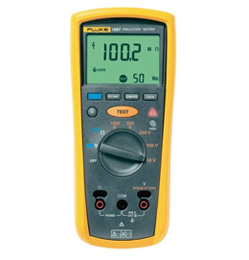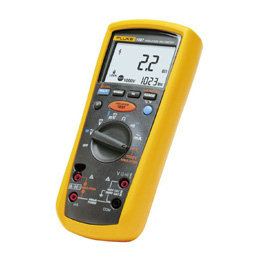When it comes to choosing an insulation meter, it may be difficult to pick between the Fluke 1587 Insulation Multimeter or the Fluke 1507 Digital Megohmmeter. Although both are made by the same company, there are clear differences between the two products. For those that need assistant in picking which meter is the best, here are some facts about the merchandise.


Fluke 1587 Insulation Multimeter
At less than 5 lbs and up to 1000 voltage, the Fluke 1587 Digital Insulation Multimeter is a must have. This product is both auto and manual and can be used to test line insulation on several equipment including motors, generators, cables, and switch gear. Unlike many other multimeters, the 1587 measures temperature and detects the functions of a circuit’s diodes through a diode test. One of the biggest incentives is that the 1587 is not only a digital insulation tester, but also a genuine RMS digital multimeter. Along with testing line insulation, this particular meter can also measure capacitance, frequency, and resistance. To make electrical work hands free, there is even a magnetic hanging system. And don’t worry; if the meter drops, it will be protected by the hard case that is included. This is a versatile meter due to its safety features, broad range of capabilities, and numerous beneficial features.
Advantages of the Fluke 1587
- Measure linear and non-linear loads accurately…it is a true RMS meter
- Unwanted voltages are blocked which provides correct AC voltage and frequency measurements.
- Insulation tests are prevented when voltages exceed 30 voltages
- There is a backlight for improved readability
- Reading on the display can be saved by pressing the hold function
- An alarm goes off when leads are connected to the wrong jack
- Battery life is conserved when the product automatically turns off after being idle for 30 minutes.
- Can display up to 5,999 units before the operating range needs to be changed
- Hard carrying case with batteries, a remote probe, alligator clips, leads, and a K-type thermocouple also included
- One of the most convenient features of this meter is the button on the red lead that initiates insulation tests. This refrains from having to hold the test lead in one hand and the meter in the other.
Disadvantage of the Fluke 1587
- Since this meter is made outside of the United States, it can be expensive to repair. This is the only downfall of the product.
Fluke 1507 Digital Megohmmeter
The Fluke 1507 is the model before the Fluke 1587 which is clearly illustrated when comparing the features of both products. The 1507 is a great product for those that are working on simple jobs, but it doesn’t have nearly as many capabilities as the 1587. For those looking to purchase a great megohmmeter, but don’t want to buy an elaborate product that would be overkill, this would be the best option. Here are some details of the Fluke 1507:
- Like the Fluke 1587, there is automatic calculation, live circuit detection for safety purposes, and a backlit display.
- The remote test probe is slender and and flexible which makes difficult testing areas easier
- There is a pass/fail function which is beneficial for repetitive testing
- Know how to use a megger and do not rely on this product’s manual.
Unlike the 1587, the 1507 does not include the following:
- Frequency
- Capacitance
- Diode testing
- Temperature measuring
- Insulation test smoothing reading
- Continuity
- Optional magnetic hanging system
It is clear that the Fluke 1587 Insulation Multimeter is the best meter on the market. The updated features, user friendly status, and tremendous accuracy surpass any other model. Combined with its safety components and immense amount of capabilities, no other meter compares.
Click here to purchase Fluke 1507 on Amazon!
Click here to purchase Fluke 1587 on Amazon!